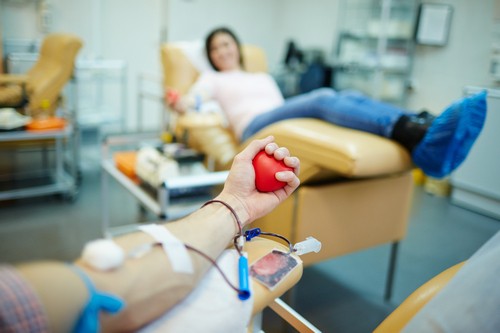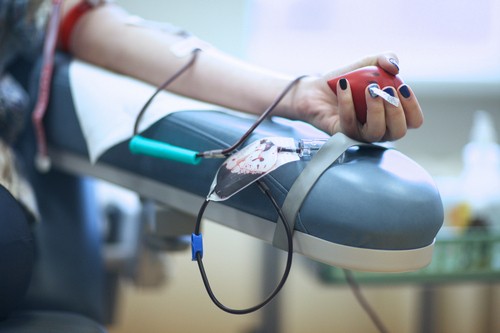There are temporary and absolute contraindications for blood donation . Temporary ones include tattooing, piercing, recent tonsillitis, flu or SARS, recent tooth extraction, menstruation, surgery, pregnancy and lactation, vaccinations and more.
To the absolute – diseases such as HIV, syphilis, viral hepatitis, tuberculosis, blood diseases and others. Before the procedure, the future donor undergoes a free medical examination by a doctor and donates blood for a preliminary laboratory examination.
There are two main types of donation. The first and most common is whole blood donation. In this case, you need to donate 450 ml of blood, which is then divided into components using a centrifuge and processed separately.
The second is the donation of blood components (platelets, red blood cells, plasma). This type of donation is used when a specific medical institution or patient needs certain components of a certain blood group. For example, in acute blood loss, red blood cells are needed, with a deficiency of coagulation factors, plasma.

Any healthy person over 18 years old and weighing more than 50 kilograms can become a donor. You can donate blood only if you are healthy and feeling good. This is important for two reasons: so the procedure will not have a negative impact on your health; the quality of the blood will be high.
The Blood Service has developed a scheme by which you can test your suitability for blood donation.
Remember what emotions the blood donation procedure caused you
Panic fear at the sight of blood will turn donation into a test. If you are very afraid, but want to help others, try to volunteer in another area where there is no direct contact with blood.
If you are panicky afraid of injections and faint at the sight of blood, then you probably do not need to torture yourself – it is better to find another way to help. The first donation always causes excitement, but the staff of the blood reception department are trying to create the most comfortable conditions for the donor.
Find your nearest blood donation point
Each city has blood donation points. Usually they are in hospitals in transfusion departments. In Moscow, you can donate blood in more than thirty medical institutions, including the Botkin, Morozov hospitals, Research Institute of Emergency Medicine. N.V. Sklifosovsky and NMIC Neurosurgery them. Academician N. N. Burdenko.
Get ready for blood donation
Do not drink alcohol 48 hours before blood donation, and take medicines that contain aspirin and analgesics in 72 hours. Do not smoke one hour before the procedure.
Your diet is important for donation: on the eve and on the day of blood donation, you should not eat fatty, fried, spicy and smoked foods, meat, fish and dairy products, eggs, dates, avocados, beets, bananas, any butter, chocolate, nuts. In this case, you do not need to donate blood on an empty stomach – you can become ill. You can eat dry dietary products: bread, crackers, drying, boiled cereals, pasta in water without oil, vegetables and fruits. It is allowed to drink sweet tea, juices, fruit drinks, fruit drinks, clean water.
You need to donate blood when you are not tired and full of energy. You should not go to the procedure after a sleepless night or severe stress the day before. Do not plan to donate blood before tense events: exams, competitions, donation of the project.

Bananas, eggs, milk affect the composition of the blood. Components appear in it that can give a false-positive test result for hepatitis and syphilis. Because of this, the donor will receive a challenge and referral for examination.
Come early
Doctors have found that the body responds best to blood loss in the morning. The sooner you donate blood, the better you will feel. Most blood donation points are open from seven in the morning. After 12 noon, donations can only be made to regular donors.
All donors donate 450 ml of blood, plus a few additional test tubes. A total of about 0.5 liters of blood is obtained. The surrender procedure itself is painless. It resembles passing an analysis from a vein, only a little longer in time. After completing the procedure, you may feel dizzy and weak. If you feel unwell, notify your healthcare provider. They will give you warm sweet tea and leave you under observation until the dizziness passes.
Rest after blood donation
No need to run after the procedure to an important meeting or training. Let the body recover. After blood donation calmly sit for 10-15 minutes. Do not smoke for an hour. On the day of blood donation, do not lift weights, eat fully and drink plenty of fluids.
Blood is donated. In many places, donors are given souvenirs or sweets as thanks for donating blood. Some companies also give employees extra days off or other bonuses for agreeing to become donors.
Regular blood loss (blood donation) contributes to the development and stimulation of the hematopoietic system. There is evidence that confirms that a person who donates blood at least once in his life has a better chance of surviving the blood loss emergency than a person who has never done so. The body will not experience shock, but will actively produce new blood cells.
Men can donate blood five times a year, women four times. Limitations are introduced so that the body of the donor between donations can fully recover. Blood donation should be completely safe first of all for the donor, this is regulated at the legislative level.



